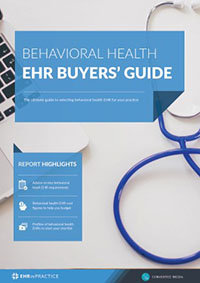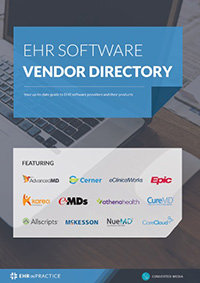Why having a specialized behavioral health EHR is essential for mental health organizations
When considering an EHR for mental health practice, the question is often raised why one would need a specialized behavioral health EHR as opposed to a general EHR. In the case of the former, the EHR is designed to accommodate the unique clinical data and regulations attendant to the delivery of mental health care. In the case of the latter, the EHR must be customized or will require add-ons to meet the needs of mental health practice. According to a recent EHR report, 11.87% of those looking for an EHR were looking for a specialized behavioral health solution; the search for specialty-specific software is guided by two factors. The first rests in the fact that the unique needs of mental health practices are often not adequately served by a general EHR. The second rests on newly emerging market pressures facing mental health practices that can be alleviated by productivity and efficiency gains realized from a specialized behavioral health EHR.
Unique needs of mental health practices
The EHR features mental health practices require unique when compared to other specialties or general medical practices. Specifically, behavioral and mental health practices have different requirements regarding how they use clinical data. Rather than customizing a general EHR, behavioral health practices, a specialized behavioral health EHR is essential for mental health organizations.
Primary among the unique challenges faced by mental health providers when compared to their peers rests in the type of clinical data they collect and their obligations regarding their patients. As noted in a 2015 article published in the Journal of the American Board of Family Medicine, discussing the differences experiences of primary care and behavioral health practices, the authors noted, "behavioral health and primary care differ in their language, classifications, codes, data reporting requirements and regulations." Further, mental health practices collect more intensive data resulting from screening tools and ongoing treatment. Further, these practices largely depend on effective care coordination across clinical settings and patient engagement to achieve positive clinical outcomes but are also subject to more data privacy laws that go above and beyond HIPAA’s requirements. As such, specialized behavioral health EHRs are better equipped to handle these unique needs.
Challenges facing mental health providers
It is not uncommon for healthcare providers to face financial pressures that arise from several factors ranging from austerity measures aimed at reimbursement for behavioral health services and competitive forces as more practices expand their service lines to include mental health services thus forcing traditional behavior health practices to face more significant competitive pressures.
Speaking to these challenges and the role specialized behavioral health can play in aiding these practices a 2018 report: “Behavioral Health 2018: A First Look at Behavioral Health EHR Performance” research organization Klas notes that with the changing regulatory environment and a more competitive market for behavioral health services “need robust IT solutions that can support their efforts. The value found in specialized behavioral health products the Klas report referred to is found in the ability to create more efficient workflows with an EHR system designed to accommodate behavioral health data, billings codes and to manage regulatory compliance. Without a specialized behavioral health EHR, these practices may place themselves at a disadvantage as the market for these services becomes more competitive.
Free white paper

Behavioral health EHR buyers' guide
A concise guide to behavioral health EHR features, pricing and vendors

Featured white papers
-

Behavioral health EHR buyers' guide
A concise guide to behavioral health EHR features, pricing and vendors
Download -

EHR Vendor Directory
Get the most up-to-date directory of EHR software vendors. Find the best software for your practice.
Download -

EHR Pricing Guide
Get your complete guide to EHR software pricing and project costs. Your headstart on EHR pricing research
Download
Related articles
-

Critical requirements for a psychiatry EHR
The most important EHR requirements that a psychiatry practice should keep in mind
-

Five essential EHR features for behavioral & mental health practices
Learn about the importance of clinical data handling to behavioral and mental health providers
-

Four mental health EHRs for your selection shortlist
Some top mental health EHR picks to kick off your vendor shortlist

